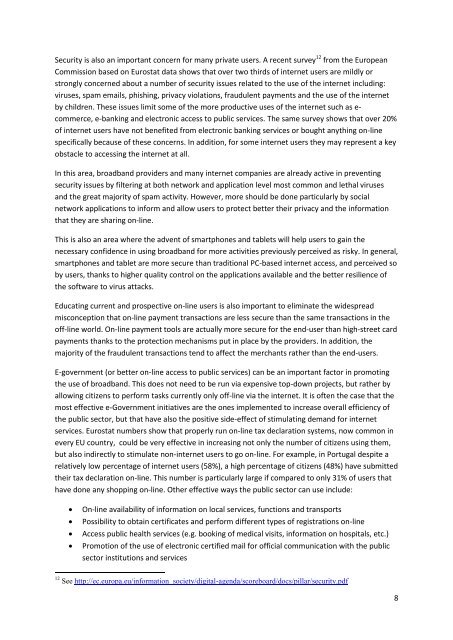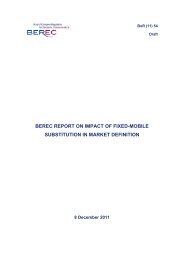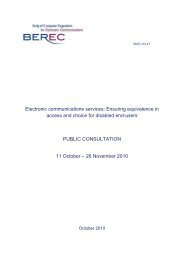Vodafone response to the public consultation by ... - BEREC - Europa
Vodafone response to the public consultation by ... - BEREC - Europa
Vodafone response to the public consultation by ... - BEREC - Europa
You also want an ePaper? Increase the reach of your titles
YUMPU automatically turns print PDFs into web optimized ePapers that Google loves.
Security is also an important concern for many private users. A recent survey 12 from <strong>the</strong> European<br />
Commission based on Eurostat data shows that over two thirds of internet users are mildly or<br />
strongly concerned about a number of security issues related <strong>to</strong> <strong>the</strong> use of <strong>the</strong> internet including:<br />
viruses, spam emails, phishing, privacy violations, fraudulent payments and <strong>the</strong> use of <strong>the</strong> internet<br />
<strong>by</strong> children. These issues limit some of <strong>the</strong> more productive uses of <strong>the</strong> internet such as ecommerce,<br />
e-banking and electronic access <strong>to</strong> <strong>public</strong> services. The same survey shows that over 20%<br />
of internet users have not benefited from electronic banking services or bought anything on-line<br />
specifically because of <strong>the</strong>se concerns. In addition, for some internet users <strong>the</strong>y may represent a key<br />
obstacle <strong>to</strong> accessing <strong>the</strong> internet at all.<br />
In this area, broadband providers and many internet companies are already active in preventing<br />
security issues <strong>by</strong> filtering at both network and application level most common and lethal viruses<br />
and <strong>the</strong> great majority of spam activity. However, more should be done particularly <strong>by</strong> social<br />
network applications <strong>to</strong> inform and allow users <strong>to</strong> protect better <strong>the</strong>ir privacy and <strong>the</strong> information<br />
that <strong>the</strong>y are sharing on-line.<br />
This is also an area where <strong>the</strong> advent of smartphones and tablets will help users <strong>to</strong> gain <strong>the</strong><br />
necessary confidence in using broadband for more activities previously perceived as risky. In general,<br />
smartphones and tablet are more secure than traditional PC-based internet access, and perceived so<br />
<strong>by</strong> users, thanks <strong>to</strong> higher quality control on <strong>the</strong> applications available and <strong>the</strong> better resilience of<br />
<strong>the</strong> software <strong>to</strong> virus attacks.<br />
Educating current and prospective on-line users is also important <strong>to</strong> eliminate <strong>the</strong> widespread<br />
misconception that on-line payment transactions are less secure than <strong>the</strong> same transactions in <strong>the</strong><br />
off-line world. On-line payment <strong>to</strong>ols are actually more secure for <strong>the</strong> end-user than high-street card<br />
payments thanks <strong>to</strong> <strong>the</strong> protection mechanisms put in place <strong>by</strong> <strong>the</strong> providers. In addition, <strong>the</strong><br />
majority of <strong>the</strong> fraudulent transactions tend <strong>to</strong> affect <strong>the</strong> merchants ra<strong>the</strong>r than <strong>the</strong> end-users.<br />
E-government (or better on-line access <strong>to</strong> <strong>public</strong> services) can be an important fac<strong>to</strong>r in promoting<br />
<strong>the</strong> use of broadband. This does not need <strong>to</strong> be run via expensive <strong>to</strong>p-down projects, but ra<strong>the</strong>r <strong>by</strong><br />
allowing citizens <strong>to</strong> perform tasks currently only off-line via <strong>the</strong> internet. It is often <strong>the</strong> case that <strong>the</strong><br />
most effective e-Government initiatives are <strong>the</strong> ones implemented <strong>to</strong> increase overall efficiency of<br />
<strong>the</strong> <strong>public</strong> sec<strong>to</strong>r, but that have also <strong>the</strong> positive side-effect of stimulating demand for internet<br />
services. Eurostat numbers show that properly run on-line tax declaration systems, now common in<br />
every EU country, could be very effective in increasing not only <strong>the</strong> number of citizens using <strong>the</strong>m,<br />
but also indirectly <strong>to</strong> stimulate non-internet users <strong>to</strong> go on-line. For example, in Portugal despite a<br />
relatively low percentage of internet users (58%), a high percentage of citizens (48%) have submitted<br />
<strong>the</strong>ir tax declaration on-line. This number is particularly large if compared <strong>to</strong> only 31% of users that<br />
have done any shopping on-line. O<strong>the</strong>r effective ways <strong>the</strong> <strong>public</strong> sec<strong>to</strong>r can use include:<br />
� On-line availability of information on local services, functions and transports<br />
� Possibility <strong>to</strong> obtain certificates and perform different types of registrations on-line<br />
� Access <strong>public</strong> health services (e.g. booking of medical visits, information on hospitals, etc.)<br />
� Promotion of <strong>the</strong> use of electronic certified mail for official communication with <strong>the</strong> <strong>public</strong><br />
sec<strong>to</strong>r institutions and services<br />
12 See http://ec.europa.eu/information_society/digital-agenda/scoreboard/docs/pillar/security.pdf<br />
8





